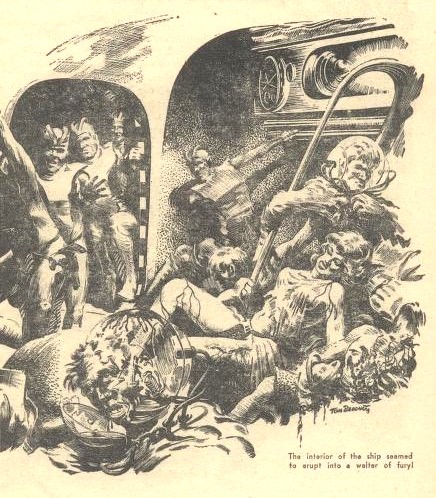SPACE OPERA is what most people think of when the subject is science fiction; it's the subgenre that the general public most often encounters at the box office (e.g., Star Wars). Colorful characters, plenty of action, and fast pacing are hallmarks of good space opera; if you throw in a hardboiled sensibility you get today's story, one that's all about why it's very, very important for our heroes to discover a . . .
"Monkey in the Ice Box."
By Gerald Vance (house name for Randall Garrett, William P. McGivern, Rog Phillips, Richard S. Shaver, Robert Silverberg,
and Henry Slesar).
SFFAudio and the ISFDb designate Rog Phillips (1909-66; Wikipedia HERE; the ISFDb HERE; the SFE HERE; Fancyclopedia HERE; and eFanzines HERE).
Illustrated by Tom Beecham (1926-2000; ISFDb HERE).
First appearance: Amazing Stories, May 1952.
Reprints page (ISFDb HERE).
Novelette (19 pages).
Online at SFFAudio (HERE).
(Parental caution: Violence and mild profanity.)
"A bullet without a gun. You don't need a gun."
SALVAGING any wrecked vehicle is always iffy at best, whether it's in an ocean of water or in the ocean of space. Joe and Scorp think that maybe their ship has come in, you might say, when they stumble across a derelict worth a sizeable sum as salvage. But Joe and Scorp will have reason to doubt their luck when a couple of well-armed and determined individuals decide to horn in on their action, people who aren't afraid to kill if it'll get them what they want. But then along comes this monkey . . .
Only in this kind of story would you be likely to read:
"We were outside gravity drag kiting for some spot in the cosmos not quite clear, along a course laid out to one-tenth the thickness of a very small gnat's eyebrow."
Principal characters:
~ Joe ("I came to first; came to with a big headache"), Scorp ("You got any green fire holes in you?"), Mike, a.k.a. Downy Ears, the curly-headed attache ("You boys kill everybody?"), Donat Singh ("Do not wish ship, I. Only first voyage"), Nicky ("Nails were soft beside Nicky"), and Loopy ("kept on jabbering, scolding them").
Typos: "spoke[?] this derelict"; "with the pellet almost ready to leave his fingers".
References and resources:
- About space opera:
"Space opera has been defined as 'a television or radio drama or motion picture that is a science-fiction adventure story.' Some critics distinguish between space opera and planetary romance. Both feature adventures in exotic settings, but space opera emphasizes space travel, while planetary romances focus on alien worlds. In this view, the Martian, Venusian, and lunar-setting stories of Edgar Rice Burroughs would be planetary romances (and among the earliest), as would be Leigh Brackett's Burroughs-influenced Eric John Stark stories.
"The term 'space opera' was coined in 1941 by fan writer and author Wilson Tucker as a pejorative term in an article in Le Zombie (a science fiction fanzine). At the time, serial radio dramas in the United States had become popularly known as soap operas because many were sponsored by soap manufacturers. The term 'horse opera' had also come into use to describe formulaic Western films. Tucker defined space opera as the science fiction equivalent: A 'hacky, grinding, stinking, outworn, spaceship yarn.' Fans and critics have noted that the plots of space operas have sometimes been taken from horse operas and simply translated into an outer space environment, as famously parodied on the back cover of the first issue of Galaxy Science Fiction. During the late 1920s and early 1930s, when the stories were printed in science-fiction magazines, they were often referred to as 'super-science epics'." (Wikipedia HERE.)
For a look at other examples of space opera, see Allan Griffiths's Vintage Pop Fictions (HERE).
- "probably an astrogator":
"Navigators are often part of a starship crew in science fiction, where they are sometimes called astrogators, a merger of the prefix 'astro' and 'navigator.' According to a science fiction citations site for the Oxford English Dictionary, the earliest known use of the word is in David Lasser's 1931 book The Conquest of Space. According to that site and also Brave New Words: The Oxford Dictionary of Science Fiction, it first appeared in science fiction in Stanley G. Weinbaum's short story 'The Planet of Doubt,' published in the October 1935 issue of Astounding Stories.
"The title character of Robert A. Heinlein's 1953 novel Starman Jones is an astrogator." (Wikipedia HERE.)
For a thorough discussion of astrogators and astrogation, go to Winchell Chung's Atomic Rockets megasite (HERE).
- "strictly for swank":
"NORTH AMERICAN ENGLISH: stylishly luxurious and expensive."
- "a small three-planet family out beyond The Great Bear":
"Ursa Major, also known as the Great Bear, is a constellation in the northern sky, whose associated mythology likely dates back into prehistory. Its Latin name means "greater (or larger) bear", referring to and contrasting it with nearby Ursa Minor, the lesser bear." (Wikipedia HERE.)
- "brought monkey worship to these people":
"Chinese religions and mythologies give monkeys and apes cultural significance as metaphors for people. Chinese deities sometimes appear in the guise of monkeys, for example, Sun Wukong or 'Monkey King' is the main protagonist in Wu Cheng'en's picaresque novel Journey to the West. In traditional Chinese folk religion, monkeys are supernatural beings that could shape shift into either monkey-demons or were-monkeys, and legends about monkey-human interbreeding are common." (Wikipedia HERE; also see HERE.)
- Other stories featuring space salvage shenanigans: Jack Williamson's "Salvage in Space" (HERE) and the Jake Murchison series (HERE).
- Our last encounter with Rog Phillips was "Love Me, Love My—" (HERE).
Unless otherwise noted, all bibliographical data are derived from The FictionMags Index created by William G. Contento & edited by Phil Stephensen-Payne.
~~~~~~~~~~~~~~~~~~~~~~~~~~~~~~~~~~~~~~~~~~~~~~~~~~~~~~~~~~~~~~~~~~~~~~~~~~~~





.jpg)



No comments:
Post a Comment